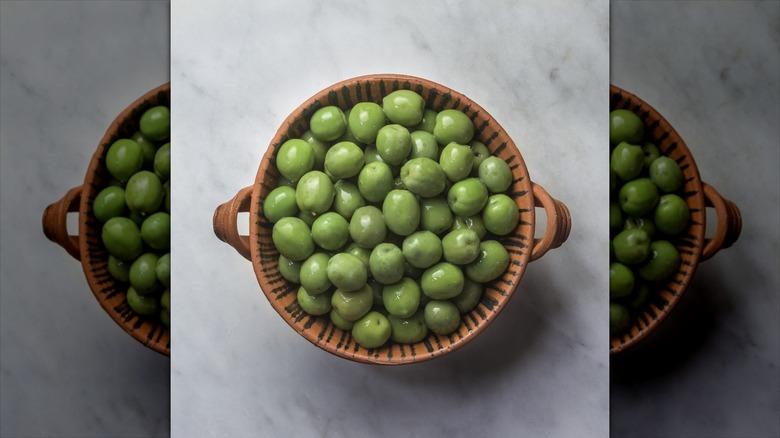The Absolute Best Type Of Olives For Martinis
Deciding between shaken or stirred is the least of your martini conundrums, despite what you might think. More than a garnish, the little green olive nestled inside the glass is what can make or break a martini. And because not all olives are created equal, we've taken out the guesswork and are sharing the absolute best variety to pair with the iconic drink.
Despite the fact that cocktail historians haven't been able to trace the exact origin of the martini, Punch reports many agree that the earliest versions of the cocktail likely included sweet gin, sweet vermouth, and bitters. However, all of these ingredients have since fallen out of fashion, causing the martini to morph into the drier, more herbaceous drink that we know today.
With nothing to hide behind, a delicious martini relies solely on a handful of the best ingredients. Aside from using high quality dry gin and dry vermouth, Golf Magazine explains that overlooked items like ice cubes and olives can actually make all the difference — the question is, which olive can transform a good martini into a great martini?
A case made for Castelvetrano olives
There are a few key garnishes that can be found decorating a classic martini like a twist of lemon or pickled pearl onion, but the most stunning of them all is the gorgeous green olive. However, if you opt for the latter, there are a few variables to consider.
Beyond aesthetics, Wine Enthusiast shares that salty and umami-rich olives can impact flavor, which is why you should lean towards varieties that'll complement rather than overpower the spirits featured in the cocktail like the Castelvetrano olive, which they describe as having a "meaty, buttery texture." Imbibe Magazine recommends a Castelvetrano olive as well. Straight from Sicily, these pale green morsels are firm with a fruity, sweet and ever-so-slightly briny flavor that makes them ideal for a herbaceous gin-based martini.
If you can't get your hands on Castelvetrano olives, Food & Wine suggests a meaty Cerignola olive for a dry martini or a pimento-stuffed Manzanilla olive to pair with a Dirty Martini. With so many olive options, you may need to do some of your own taste testing — it's for research after all.

